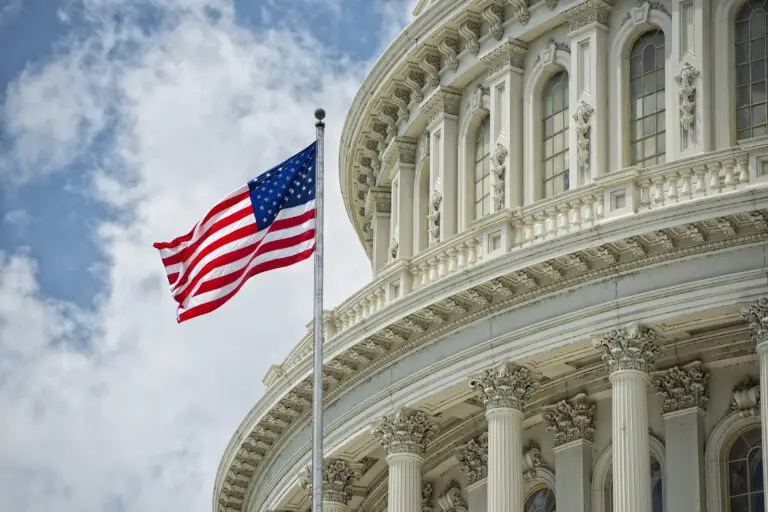As the U.S. approaches its Presidential election this November, the political landscape is set to undergo dramatic changes. On the Republican side, Donald Trump, despite his controversial first term and ongoing legal battles, remains the party’s chosen candidate.
While with President Joe Biden deciding to pass the baton to Vice-President Kamala Harris, joined by Minnesota Governor Tim Walz as her running mate, the two are now leading the Democratic ticket. And while many people believe the pair stand a solid chance of winning the White House, we should still consider what a Trump victory could mean for the recently elected Labour government.
Under the new leadership of Prime Minister Keir Starmer, the prospect of Trump’s return brings a host of challenges that could reshape diplomatic, economic, and security ties with the UK.
The UK-U.S. “special relationship” at a crossroads
The UK has long valued its “special relationship” with the U.S., a bond that stretches across decades of shared history and policy alignment. However, Trump’s foreign policy, marked by unpredictability and a focus on “America First,” could place unprecedented strain on this relationship. For Prime Minister Keir Starmer, who took office back in July after Labour’s decisive electoral win, a second Trump term would test his government’s ability to maintain diplomatic ties while pursuing its progressive domestic agenda.
Trump’s reluctance to adhere to international norms could challenge the UK’s stance on global issues, such as climate change, trade, and security. Starmer, who champions multilateralism and closer ties with Europe post-Brexit, would need to navigate a more isolationist U.S. that prioritises protectionism and unilateral actions.
Trade policy at risk from U.S. protectionism
A key area of concern for the UK is trade. During Trump’s first term, his administration imposed tariffs and renegotiated trade agreements, aiming to protect American industries. If re-elected, Trump’s proposed 10% tariff on all imports could severely disrupt UK-U.S. trade, further complicating Britain’s post-Brexit economic recovery.
The UK, still seeking to secure a comprehensive trade deal with the U.S. after leaving the European Union, would find itself negotiating under difficult circumstances. Starmer’s government, with a focus on economic stability and rebuilding ties with Europe, may need to navigate a turbulent transatlantic trade environment.
Moreover, the Labour government’s desire to strengthen ties with the EU may collide with Trump’s antagonism toward multilateral organisations, leaving the UK in a difficult position between its European neighbours and the U.S.
Diverging environmental agendas
Climate change is another area where a second Trump term could strain relations. Trump famously withdrew the U.S. from the Paris Agreement in 2017, and his re-election could see further setbacks in global climate efforts.
Trump’s anti-climate policies would be especially problematic for Starmer, whose government is focused on leading global climate initiatives. A divergence in U.S.-UK environmental priorities could complicate international cooperation, especially if Trump seeks to weaken environmental regulations and undermine the global green transition.
Yet, Prime Minister Keir Starmer faces his own challenges on green investment. Initially pledging £28 billion per year for green infrastructure, Starmer’s government has since revised this ambitious commitment, reducing the annual figure significantly due to economic constraints and the ongoing cost-of-living crisis.
A more fragile NATO alliance
Perhaps the most significant concern for the UK under a second Trump presidency is security. Trump’s disdain for NATO, expressed repeatedly during his first term, raises questions about the future of the alliance. While he did not succeed in withdrawing the U.S. from NATO, his return to office could see reduced American commitment to European defence.
Prime Minister Starmer would face a delicate balancing act. The UK relies heavily on NATO and its partnership with the U.S. to maintain security in Europe, particularly in the wake of ongoing Russian aggression in Ukraine. To pre-empt a potential transatlantic rift, we’ve seen a lot of discussions recently about a defence and security agreement between the UK and the European Union.
Diplomatic and multilateral tensions
Finally, Trump’s return to the global stage could exacerbate diplomatic tensions between the UK and U.S. In the Middle East, his strong pro-Israel stance could clash with Starmer’s likely advocacy for a two-state solution and an emphasis on human rights. The differing approaches could cause diplomatic friction, requiring careful navigation by Starmer’s government to maintain U.S. cooperation on broader Middle Eastern issues.
Trump’s unilateral approach to foreign policy, disdain for multilateral institutions, and transactional view of alliances would challenge Starmer’s preference for cooperation and diplomacy. Europe is already bracing itself for the possibility of a Trump re-election, seeking ways to ‘Trump-proof’ its policies in case of sudden shifts in U.S. foreign relations.
Starmer, who seeks to reset the UK’s reputation on the world stage after a tumultuous Conservative leadership, could find himself at odds with Trump on key global issues, from trade agreements to international law. Maintaining the “special relationship” while navigating these ideological differences means Starmer would need to balance his government’s progressive agenda with the realities of Trump’s unpredictable foreign policy.




